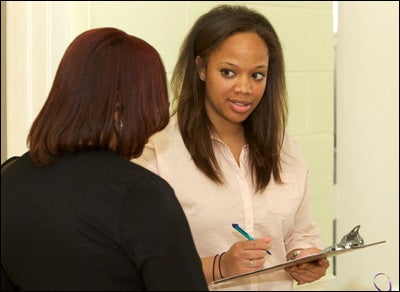‘FIRST YEAR OF OUR CAREERS’
Medical student Diana Spell shares her third year experiences
This story is part of a series that is following four medical students through school. For the article about their second year, click here. (http://www.ecu.edu/cs-dhs/dhs/mission/second_rounds.cfm)
Three years into medical school at East Carolina University, Diana Spell finally feels like she can offer a road map to incoming students.
“First year, you learn everything that goes right (in the body),” she said. “Second year, you learn everything that goes wrong.”
And the third year?
“You’re free,” the 25-year-old said, and laughed. “It solidifies why you went into medicine. This was like the first year of our careers.”
Spell may be relaxing because she completed Step 1 of the U.S. Medical Licensing Examination – the Boards — in 2011. It’s a cumulative test examining all the systems and science students learned in the first two years of medical school.
Spell still has to take the Step 2 clinical exam this summer, but she said it tests skills she practices every day.
“Basic run-of-the-mill things that we see in eastern North Carolina, I feel very prepared for,” she said. “Diabetes, high blood pressure, substance abuse…cirrhosis of the liver.”
Third-year Brody School of Medicine students such as Spell take rotations in ECU clinics and at Vidant Medical Center in areas of study including family medicine, pediatrics, internal medicine, psychiatric medicine, obstetrics and gynecology and surgery. Spell also completed an elective rotation in nephrology, as the kidneys continue to be her primary interest.
More tough decisions lie ahead. With her surgery rotation a few weeks away, Spell knows she’ll soon decide whether she wants to focus her efforts in the operating room and consider how that might balance with other life pursuits, like starting a family.
“Now I’m having the battle of…can I live a life without surgery?” she said. “A lot of people enjoy the O.R. It’s kind of like recess. You learn all about the body and then all of a sudden you’re looking at the abdominal aorta pumping. You can touch an organ and it’s OK. It’s right there.”
Even if she opts for the operating room or the hospital, Spell said the time in clinics taught her to build relationships with patients.
“I’ll see the patient as a person, and not just someone I’m cutting on,” she said. “Most people who come into the hospital come for help. And they’re willing to tell you everything they need to so they can get better. To keep that trust is what we have to learn.”
Spell remains dedicated to volunteerism through activities coordinated by the Brody Scholars Program. One Saturday in March, she was working at a free stroke screening event in Tarboro. She said she also regained her social life this year.
Attending Match Day for the first time March 16, Spell watched as fourth-year students learned where they’d be completing residency and grew anxious with anticipation.
“I’m ready to really have that M.D. behind my name,” she said, “Really have the long coat. That’s exciting.”
